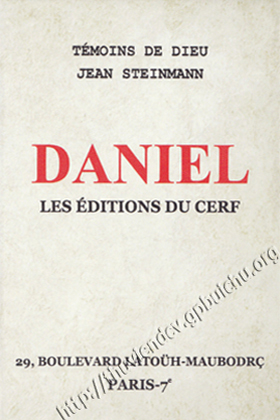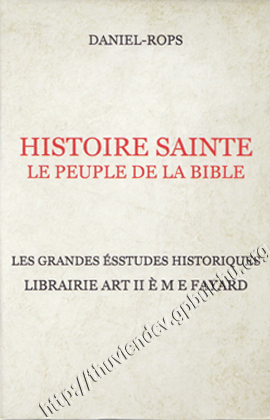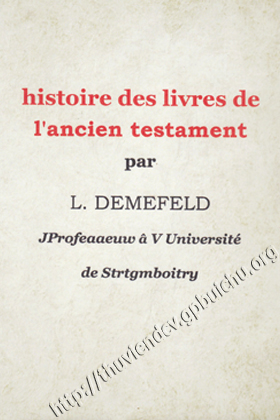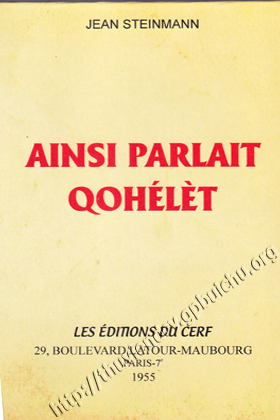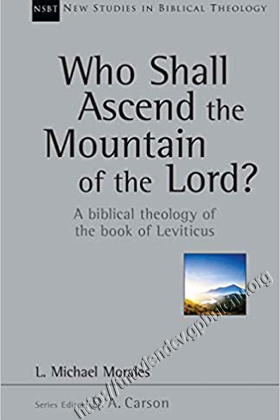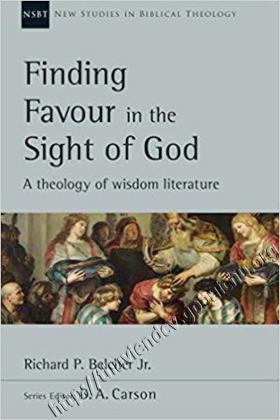
| Finding Favour in the Sight of God | |
| Phụ đề: | A Theology of Wisdom Literature |
| Tác giả: | Richard P. Belcher Jr |
| Ký hiệu tác giả: |
BE-R |
| DDC: | 223 - Các sách Lịch sử và Ngôn sứ |
| Ngôn ngữ: | Anh |
| Tập - số: | Vol 46 |
| Số cuốn: | 1 |
Hiện trạng các bản sách
|
||||||||||||||||
» Thêm vào danh sách tác phẩm yêu thích
| Series preface | xi | |
| Author's preface | xiii | |
| Abbreviations | xv | |
| 1 | The problem of wisdom literature in Old Testament theology | 1 |
| Wisdom literature: an orphan in Old Testament theology | 1 | |
| The difficult nature of wisdom literature | 3 | |
| A new foundation of wisdom literature: creation | 4 | |
| The influence of wisdom in the Old Testament | 7 | |
| The definition of wisdom | 8 | |
| The development of wisdom in biblical theology | 11 | |
| The plan of the book | 14 | |
| 2 | The message of Proverbs 1-9 | 17 |
| A brief introduction to the book | 17 | |
| The preamble (1:1-7) key concepts and people | 19 | |
| Proverbs 1:8- 9:18: a choice between two ways | 22 | |
| Christological implications of Lady Wisdom | 37 | |
| 3 | The4 hermeneutics of Proverbs | 39 |
| The genre of a proverb | 39 | |
| The lack of literary context | 40 | |
| Secular or religious meaning? | 41 | |
| Are the proverbs absolute statement? | 42 | |
| Literary context in the book of Proverbs | 43 | |
| The context Proverbs 1-9 | 45 | |
| The canonical context | 45 | |
| Life context | 46 | |
| 4 | The theology of Proverbs | 53 |
| Theology from proverbial sayings | 53 | |
| The sovereignty of God | 53 | |
| Creation order | 55 | |
| Life" in Proverbs: one horizon or two? | 67 | |
| 5 | Theological issues in Job 1-3 | 75 |
| A brief introduction to the book | 75 | |
| Theological questions raised in Job 1-3 | 78 | |
| Job's curse-lament in Job 1-3 | 83 | |
| 6 | Divine retribution, suffering and God's justice (Job 4-26) | 89 |
| Eliphaz: a counsellor who misses the mark | 90 | |
| Bildad: the defender of God' justice | 93 | |
| Zophar: the interpreter of God 'ways | 94 | |
| A summary of the theology of the friends | 96 |
| Job defends his innocence | 98 | |
| Job wrestles with despair | 99 | |
| Job's growing confidence | 102 | |
| 7 | Where is wisdom to be found? (Job 27-42) | 109 |
| The collapse of the debate | 109 | |
| Job' final words | 110 | |
| Elihu: friend or foe? | 116 | |
| God's speeches and Job's response | 120 | |
| The epilogue: the renewal of God's blessing | 126 | |
| The theological message of the book of Job | 127 | |
| The message of Job and Jesus | 131 | |
| 8 | Key questions concerning the book of Ecclesiastes | 133 |
| Authorship | 133 | |
| Genre | 134 | |
| Structure | 135 | |
| Approaches to Ecclesiastes | 136 | |
| The role of the calls to enjoyment | 139 | |
| The epistemology of Qoghelet | 140 | |
| The phrase 'under the sun' | 142 | |
| The role and meaning of hebel | 142 | |
| The breakdown of the deed-consequence relationship | 144 | |
| A summary of the conclusions | 145 | |
| 9 | The message of Qohelet | 147 |
| Prologue: exploration of the nature of the world (1:1 -11) | 147 | |
| The search for meaning under the sun (1:12-6:9) | 149 | |
| Human limitations concerning knowledge (6:10-10:20) | 161 | |
| Living with the uncertainty of the future (11:1-12:7) | 167 | |
| 10 | The theology of Ecclesiastes | 171 |
| Qohelet's view of the works of God | 171 | |
| Qohelet's view of God | 178 | |
| Qohelet's view of the works of the world | 180 | |
| Qohelet's message and New Testament teaching | 182 | |
| The theological message of Ecclesiastes (12:8-14) | 183 | |
| The purpose of the book of Ecclesiastes | 186 | |
| 11 | Jesus and wisdom | 189 |
| Wisdom in the teaching of Jesus | 189 | |
| Wisdom and person of Christ | 202 | |
| Wisdom and the work of Christ | 210 |








